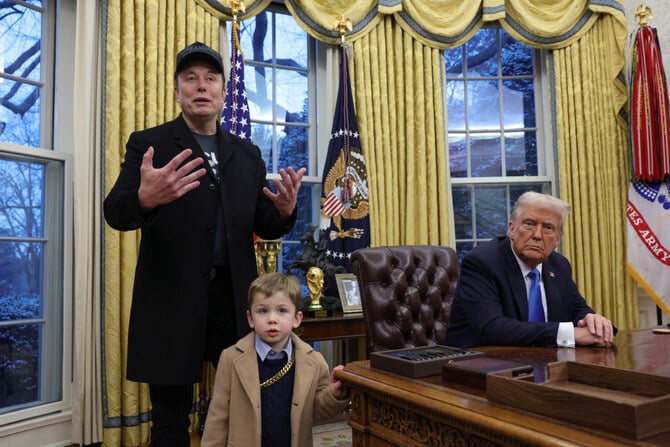Tech billionaire Elon Musk, appointed by President Donald Trump to lead federal cost-cutting efforts, warned on Tuesday that the United States would go "bankrupt" without significant budget reductions.
Speaking alongside Trump at the White House, Musk emphasized the urgency of addressing the country’s growing fiscal deficit, which surpassed $1.8 trillion in the last fiscal year. Musk heads the newly created Department of Government Efficiency (DOGE), a controversial initiative designed to streamline federal spending. The department's efforts align with Trump’s recent executive actions aimed at reducing government expenses. However, these sweeping cost-cutting measures have led to a series of legal battles, with federal judges questioning their legality.
Trump’s cost-reduction policies have resulted in the shutdown of several federal agencies, forcing employees into indefinite unpaid leave. The drastic measures have triggered lawsuits across the country, with opponents accusing the administration of executive overreach. Despite the legal turmoil, Musk insisted that cutting federal expenditures was "not optional" and warned of severe economic consequences if spending continues unchecked.
Musk's leadership of DOGE has also raised concerns over conflicts of interest. As the CEO of SpaceX and Tesla, both of which hold lucrative government contracts, Musk faces scrutiny over his influence in reshaping federal spending. In response to these concerns, Musk stated that he is striving for "maximum transparency" in his role. However, critics have raised alarms over DOGE’s access to personal and financial data through the US Treasury, questioning whether the department is exceeding its authority.
With mounting legal challenges and widespread opposition, the fate of Trump’s cost-cutting agenda—and Musk’s role in it—remains uncertain.
Speaking alongside Trump at the White House, Musk emphasized the urgency of addressing the country’s growing fiscal deficit, which surpassed $1.8 trillion in the last fiscal year. Musk heads the newly created Department of Government Efficiency (DOGE), a controversial initiative designed to streamline federal spending. The department's efforts align with Trump’s recent executive actions aimed at reducing government expenses. However, these sweeping cost-cutting measures have led to a series of legal battles, with federal judges questioning their legality.
Trump’s cost-reduction policies have resulted in the shutdown of several federal agencies, forcing employees into indefinite unpaid leave. The drastic measures have triggered lawsuits across the country, with opponents accusing the administration of executive overreach. Despite the legal turmoil, Musk insisted that cutting federal expenditures was "not optional" and warned of severe economic consequences if spending continues unchecked.
Musk's leadership of DOGE has also raised concerns over conflicts of interest. As the CEO of SpaceX and Tesla, both of which hold lucrative government contracts, Musk faces scrutiny over his influence in reshaping federal spending. In response to these concerns, Musk stated that he is striving for "maximum transparency" in his role. However, critics have raised alarms over DOGE’s access to personal and financial data through the US Treasury, questioning whether the department is exceeding its authority.
With mounting legal challenges and widespread opposition, the fate of Trump’s cost-cutting agenda—and Musk’s role in it—remains uncertain.















